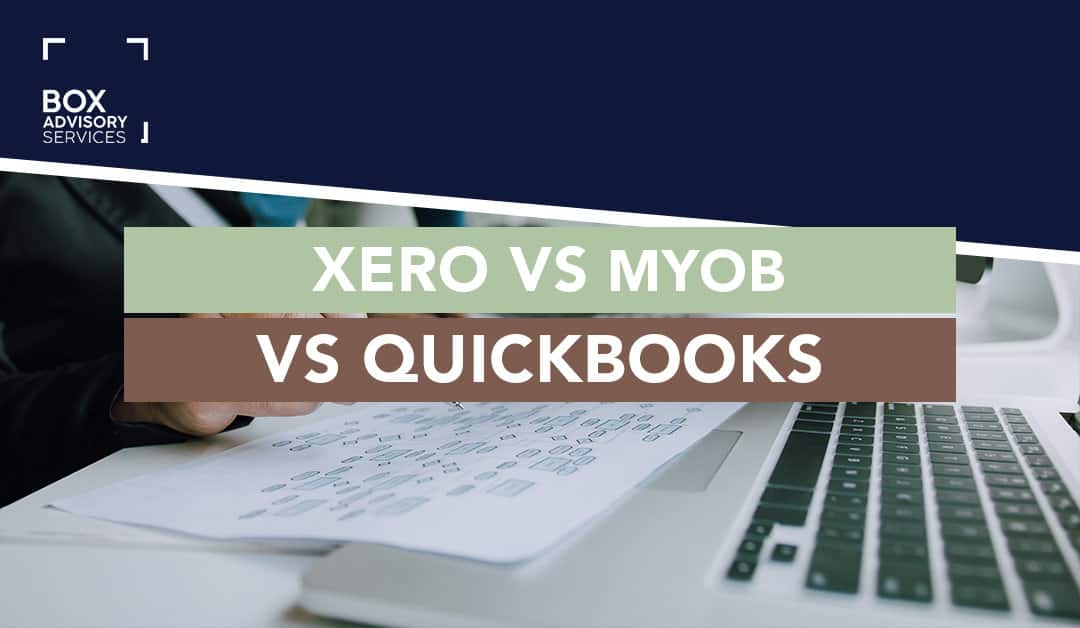Inaccurate payroll and bookkeeping are common issues that many businesses face. From initial employee hiring to day-to-day tasks such as expense management or paying vendors, businesses are always looking for ways to save time by automating their processes.
Though some might think it’s expensive upfront, using the software could be one of your best investments yet!
With so many different accounting software options out there, it can be hard to know which one best suits you and your business.
When it comes to MYOB Vs. Xero (and even Quickbooks), they all have their pros and cons.
So, in this article, we’ll break down the differences between three popular accounting software packages.
Contents
Xero Accounting Software
Xero has gained significant traction in recent years, and, in my opinion, it’s by far the most user-friendly accounting software of the three.
Beneficial Features
Here are a few of the features that set Xero apart from the rest:
- Focus on education: the tool is only as good as the user, so Xero places significant focus on educating its users by providing informative and interesting online training tools and 24/7 online support.
- No jargon: Xero tries to remove most accounting jargon and instead uses simple terms so that business owners without an accounting background can easily understand and do bookkeeping by themselves. For example, instead of “debit” and “credit”, the software uses “spent” and “received”.
- Cloud-based software: Xero is cloud-based, so there’s no need to update the latest version constantly.
- Accessibility: anyone with the authorised login details can access the accounts anytime, as long as they’re in a WiFi zone.
- Mobile app: for those who like having quick access on their phone, there’s a well-developed app that works on iOS and Android.
Potential Pitfalls
While Xero has some fantastic features, it’s also essential to weigh up the potential pitfalls of the programme – so that you can make the best decision on software that can work for your small business.
For example, Xero has basic inventory tracking software, and it cannot automatically calculate commissions. So, if you want to track your inventory and have multiple payroll structures, Xero might not be the best solution.
However, it’s worth considering that they have a list of software partners that integrate with Xero and solve that problem.
MYOB Accounting Software and Solutions
Unlike Xero, which was only launched in 2006, MYOB has been around since the early nineties. So, they’ve always been known as the king of traditional accounting software.
For example, MYOB business solutions has always been popular amongst sole traders and small businesses because they can help you do all the basic accounting tasks like lodging your BAS statement, tracking all your bills and GST, and issuing invoices straight from the software.
Here are a few benefits and downsides to the software that you should consider before signing up.
Key Features and Benefits
- Cloud-based software: Although MYOB is known for its traditional accounting processes, they’ve also realised the importance of keeping up with the times and now offer cloud-based accounting software.
- Single-touch payroll: MYOB comes standard with single-touch payroll, which you can use for one employee. However, an add-on feature allows you to organise your payroll for unlimited employees (something Xero doesn’t offer).
- Inventory manager: MYOB helps you manage inventory and track jobs with ease. For example, you can track sales and stock across many locations and record purchases and sales in different currencies.
- Accessibility is similar to Xero; you can access accounting records anywhere, anytime.
- The AccountRight feature allows you to manage different business accounts with one username, which is perfect for running multiple businesses. Of course, MYOB will keep each business separate, but you can prepare business reports for each company without logging in and out of different software.
Downsides of the Software
The biggest problem that most people have with MYOB is that it still operates as a desktop version. Unfortunately, this means that you’ll have to upgrade to newer versions of the software each time they’re released.
This can be quite a nuisance because all the users will have to ensure they’ve all updated their software; otherwise, things could get messy.
But they’re new to the cloud technology game, so hopefully, we’ll see some improvement in this aspect.
QuickBooks
QuickBooks has similar features to MYOB because it adopts a more traditional accounting approach.
But there are some differences – so here are a few of the benefits and potential disadvantages of the QuickBooks accounting software.
Software Benefits
- Various product offerings: It has different product offerings for different-sized businesses. For example, SimpleStart would be great for small businesses, while Online Plus is excellent for small to medium-sized businesses. They also offer QuickBooks Self-Employed for sole traders, which is fantastic for people and startups looking for a basic accounting tool.
- Numerous integration features: QuickBooks also offers the most integrations of all the accounting software out there. There are more than 650 integrations, with 25 of those being just payment processing options.
- Inventory management: QuickBooks enables you to input customer and ordering information while maintaining inventory data.
Disadvantages
As with Xero and MYOB, QuickBooks also has a few downsides.
Unfortunately, the software is quite buggy. In other words, it often lags and even hangs if you ask it to do too many things. Slow software is usually the last thing anyone wants to deal with – especially if bookkeeping is not your cup of tea.
They also don’t have the most outstanding reputation regarding customer support – and with significantly fewer training tools, it is not very easy for business owners to navigate the software.
Price Comparison: Xero vs Quickbooks vs MYOB
Xero can range from $32 per month for the starter package to $115 for the premium package, -depending on how many employees you have. The more employees you have, the more expensive the premium package will be. Adding on other features, such as time tracking and rostering, will also come at an additional cost.
MYOB also starts at $30 per month for the starter and can cost you $55 for the premium software. If you prefer to go for the AccountRight software, the Plus plan is $136 per month, and the Premier version is $170 per month. Payroll features come at an additional cost.
Quickbooks comes in at the lowest starter price, at $25 per month for their Simple Start software and $40 to $50 per month for their Essentials and Plus packages. Of course, you’ll have to add on the cost of payroll per employee, but it’s the most cost-effective option out of the three.
Key Takeaways
- Xero is the most user-friendly option, with a focus on education, plain language, and accessibility through cloud-based software and mobile apps. However, it has weaknesses in inventory management and commissions, and can be the more expensive route to take.
- MYOB is an established software with strengths in payroll, inventory management, and accessibility through cloud-based software. But it still relies on desktop software upgrades.
- QuickBooks offers various products for different business sizes and has the most integrations. But it can be buggy, lacks training, and has poor customer support.
- In terms of pricing, QuickBooks starts at the lowest monthly cost, while Xero and MYOB have similar pricing tiers. All three have additional fees for more advanced features, like payroll.
Our team at Box Advisory Services is certified to offer training for Xero, MYOB, and Quickbooks. So, if you need some help deciding which software to go with, how to set it up, and how to manage it all, make sure to book a free consultation with us to assess your situation.
FAQs
Do Accountants Prefer MYOB or Xero?
In Australia, most accountants seem to prefer Xero over MYOB. Xero has gained significant market share in recent years and is now used by over 1 million subscribers in Australia. Many accountants cite Xero’s user-friendly interface, extensive feature set, integrations, and mobile access as reasons for their preference over MYOB. However, MYOB does retain a loyal user base among accountants as well.
Why Do Accountants Prefer Xero?
Accountants tend to prefer Xero because of its modern cloud-based design, intuitive interface, wide range of features, and ability to integrate with hundreds of business apps.
Xero makes it easy to collaborate with clients in real-time, access files from anywhere, and streamline bookkeeping, invoicing, and advanced reporting. The automatic bank feeds, automated reconciliations, and seamless payroll integration are also big time savers.
Overall, Xero reduces the manual data entry for accountants and provides excellent visibility into their clients’ finances.
Is Xero Compatible with MYOB?
Yes, Xero offers integration with MYOB AccountRight, MYOB Essentials and MYOB Advanced. This allows accountants to migrate clients from MYOB to Xero or run the two platforms in parallel during a transition period.
The MYOB to Xero conversion tool lets you easily transfer lists like contacts, accounts, items, etc. And the AccountRight Live Connector syncs data between the two systems automatically. So Xero does provide compatibility with MYOB software.
What is the Market Share of MYOB vs Xero?
In Australia, Xero now has over 60% of the online accounting software market, while MYOB has around 20-25%. A decade ago, MYOB was dominant with over 80% market share, but Xero has experienced tremendous growth since launching in Australia in 2010.
Xero passed 1 million subscribers in Australia in 2019, while MYOB has around 400,000. So Xero has taken the lead in market share locally, but MYOB maintains a strong presence, especially among traditional desktop software users.
What is Desktop Accounting Software?
Desktop accounting software refers to accounting and bookkeeping programs that are installed and run locally on a computer’s hard drive, rather than through cloud-based servers. It typically provides tools for key accounting activities like managing accounts receivable/payable, tracking inventory, processing payroll, generating financial statements and more. Well known desktop accounting software includes QuickBooks Desktop, Sage 50, Microsoft Dynamics GP, and older versions of MYOB Business AccountRight.
Desktop programs require manual updates and backups can only be accessed from that computer. While cloud systems are gaining popularity, many businesses still prefer the full control, customisation and offline access of desktop accounting software installed on their local machine


